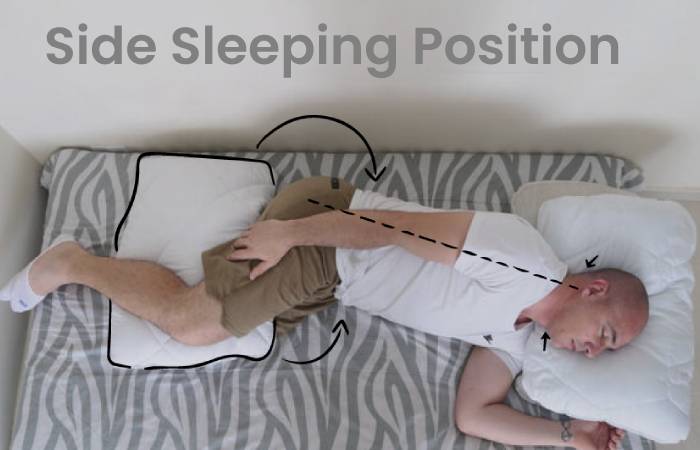Between likes, there are no dislikes we all sleep differently, across the bed and sleeping positions, with many pillows or none. But have you ever wondered what is the most convenient for your health, what is the best sleeping position?
Table of Contents.
The truth is that just by identifying bad positions at bedtime you can have a better rest and this will be reflected in your overall well-being. Moreover, if you are pregnant or suffer from reflux, it will be very good for you to know these tips.
Also Read: SLEEPING POSTURE: IMPACTS DOES IT HAVE ON YOUR HEALTH
Sleeping on your back
It is very rare to sleep on your back: only 8% of people do it. If you do, the good news is that this pose is great for preventing neck and back pain. Sleeping on your back keeps your head, spine, and back in a neutral position, taking pressure off more of the joints in these areas.
Sleeping on your back also helps reduce your risk of gastric reflux, as long as you use a pillow that keeps your head higher than your chest and prevents your stomach contents from moving up through your digestive tract.
The biggest downside to sleeping on your back is that it increases your risk of snoring and/or sleep apnea, compared to sleeping on your side. When you sleep on your back, your tongue can block the space in your oropharynx that you breathe through, making it difficult to breathe normally.
If you snore or have episodes of sleep apnea, try the lateral position to improve your symptoms.
Side sleeping Position

When it’s time to sleep, do you lie on your side with your back and legs straight? This is how 15% of adults do it, and it’s a great position to sleep in.
Unlike sleeping on your back, sleeping on your side reduces symptoms of sleep apnea and can reduce snoring. Sleeping on your side with a straight back keeps your spine in alignment, which can reduce the risk of neck and spine pain.
But there is a downside. Sleeping on your side can put pressure on the hip you sleep on. You can ease this by putting a soft pillow or folded blanket between your knees.
Also, if you’re interested in staying young as long as possible, keep in mind that pressing half of your face against the pillow can cause premature wrinkles.
Sleeping on your stomach
Only 7% of adults prefer this position. If you are part of this 7%, it is worth trying another position, since sleeping on your stomach carries many risks.
For starters, it’s difficult to keep your spine in a neutral position while on your stomach, and this can cause neck and back pain. Also, this pose puts pressure on your joints and muscles, which can cause pain, numbness, and tingling.
It’s best to avoid this position altogether, but if it’s the only position you can sleep in, you can reduce your risks by:
- Sleep with your face down instead of to the side. This will keep your airway open.
- Rest your forehead on a slightly softer pillow.
Sleeping in the fetal position
The fetal position is by far the most common: about 40% of people curl to the side at night. Good news for you if you are part of this group, as the fetal position keeps the spine neutral, thus helping to prevent back pain.
Animal studies show that sleeping curved may reduce your risks of brain diseases, such as Alzheimer’s or Parkinson’s.
But this posture has more advantages.
Pregnant women may benefit from sleeping in the fetal position at night, as doing so:
- Improves circulation in the body
- Improves your baby’s circulation
- Prevents your uterus from pressing on your liver
While there are a few downsides to sleeping in the fetal position, there’s one that’s worth noting: Curling too much throughout the night can restrict your breathing and cause you to ache.
If you notice that you have discomfort when you wake up, try to make your body more upright the next time you sleep.
The best sleeping position
So what is the best posture?
Sleeping on your side carries fewer health risks than other positions while sleeping on your stomach has significant drawbacks. However, since each person is different, it is difficult to say that a specific sleeping position is the best.
If you have or think you have, a condition that may be affected by your sleeping position, talk to a doctor.
Remember that even if you are going to sleep in a certain position, it is unlikely that you will sleep all night in that position. Most people move 10 to 12 times an hour when sleeping, which means they may change positions at night.
Also Read: Training That Strengthens Your Mind Inwards And Outwards
No matter what YOUR SLEEPING POSIT
The above satisfied is for instructive and educational purposes just and has been created with solid clinical sources and proposals from wellbeing specialists. Assuming you feel related to any indication, clinical term portrayed or you are a patient, we suggest you counsel your primary care physician.


